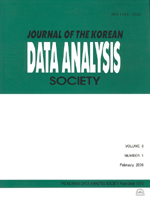대학생의 성인애착유형에 따른 내현적 자기애와 사회적 자기 효능감의 차이
Covert Narcissism and Social Self-Efficacy Differences of College Students in Adult Attachment Styles
- 한국자료분석학회
- Journal of The Korean Data Analysis Society (JKDAS)
- Vol.13 No.1
-
2011.02163 - 171 (9 pages)
- 135

본 연구는 대학생의 성인애착유형에 따라 내현적 자기애와 사회적 자기 효능감에 차이가 존재하는지를 살펴보고자 하였다. 이를 위해 남녀 대학생 141명을 대상으로 성인애착척도(ECR), 내현적 자기애 척도(CNS)와 사회적 자기 효능감 척도(SSES)를 사용하여 설문조사를 실시하였다. 그 결과, 내현적 자기애 점수에서는 안정형-거부형 애착 유형 간에는 유의미한 차이가 없었으며, 안정형-집착형, 안정형-두려움형에서만 유의미한 차이가 나타났다. 이는 안정형과 거부형은 긍정적인 자기모델을 가진 애착 유형이기 때문에 자신에 대해서 부정적 인상을 반영하는 내현적 자기애 점수의 차이가 나타나지 않은 것으로 해석할 수 있다. 한편, 사회적 자기 효능감 점수에서는 안정형-두려움형 애착유형 간에만 통계적으로 유의미한 차이가 나타났다. 이는 집착형은 부정적인 자기모델을 가지고 있으나, 대인관계에서 긍정적인 타인모델을 내면화함으로써 긍정적 자기모델을 가진 안정형과 거부형과 차이를 보이지 않은 것으로 해석할 수 있다.
This study is to look into the covert narcissism and social self-efficacy differences of college students by adults attachment style. 141 Korean undergraduates completed the experience in close relationships, covert narcissism scale and social self-efficacy scale. As a result, there weren’t significant difference in the score of covert narcissism between secure style and dismissed style. There were significant differences in secure-preoccupied style and secure-fearful style. It can explain that secure style and fearful style who had positive self-model don’t show significant difference in score of covert narcissism that is reflected negative self-model. Meanwhile, in the score of social self-efficacy, there were significant difference only between secure style and fearful style. This result can explain as follows. People with dismissed style had negative self-model, but they internalize positive others- model in personal relations. Therefore, there weren’t difference between secure style and dismissed style who had positive self-model in score of social self-efficacy.
1. 서론
2. 이론적 배경
3. 연구방법
4. 분석결과
5. 결론
참고문헌
(0)
(0)